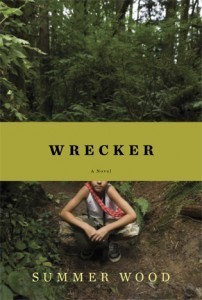Sandra Gulland's Blog, page 34
May 15, 2011
The tai chi of inspiration
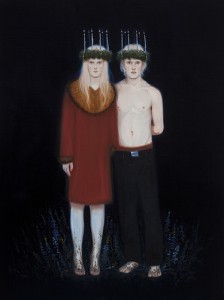
I went to Toronto this week to go to the book launch of friend Victoria Zackheim's anthology—He Said What? (a wonderful book)—as well as to see Kris Knight's art exhibit, "Tragic Kingdom."
Kris tweeted long ago that he was working on the paintings for this show. I didn't know Kris from Adam, but what caught my attention was that he mentioned that he was inspired by the work of three authors: one of whom was me.
I immediately responded that this was a show I very much wanted to see. Last week he let me know that the show was opening, and I immediately made plans. I had to see it.
One of the most gratifying and also surprising things about becoming a writer is when other creatives—artists, poets, dancers, actors—are inspired by your work and create something from that. It's an intimate and meaningful connection.
Claire Naylor, who twice performed a one-woman show based on Josephine B. at the Edinburgh Fringe Festival, has since become a dear friend. I wept seeing a video of her performance.
Rachel Maes, then a high school student, sent me a long poem she'd written about Josephine. She and her mother came to my reading in Illinois and she told me how much my work meant to her. (She's read the Trilogy six times!) I wept, I was so moved, sending book store staff scrambling for tissue. Now Rachel has graduated from university and has married; I see her often on my FaceBook page.
Beckah Reed (formerly Voigh) is a dancer in St. Louis. She performed a one-woman show on Josephine. Yes, you guessed it: I wept watching the video. When I was in St. Louis on tour, we met. I felt she was a sister. I was exhausted from the tour, and she kindly offered "energy work"—which sounded immensely appealing.
It was a profoundly relaxing as well as moving experience. Beckah "saw" Diablo, the horse in Mistress of the Sun, a novel she knew nothing about. I've worked with her since, and she's given me images that resonated, things I've incorporated into the novel I'm writing now.
Again, it seems a movement of creative energy back and forth, back and forth. I think of it as the chi of tai chi (my personal definition).
And now, Kris Knight: such beautiful paintings! There they all are—the Merveilluses, the Incroyables, the Dauphin, the Prince Parvenu—citizens of a lost and yes tragic kingdom, brave in their candle crowns.
If you ever have a chance to see Kris's work, do go. (He shows in Toronto, New York, London and Amsterdam.)
One of the paintings in this show expressed, to me, the spirit of a book I'm planning to write in the future. I'm thrilled—thrilled!—to say that my husband and I have just bought The High and the Mighty (see image above).
My work inspired Kris, and now his work inspires me. How perfectly chi.
—–
About Kris's Toronto show, Tragic Kingdom:
"In his new series, Toronto-based artist Kris Knight paints a makeshift misfit kingdom that revolves around the narrative of a romantic secret society. Drawing from personal histories of rural escapism through imagination, Knight paints disenchanted youths who long for the drama and grandeur of the old world dynasties."
To see more of Kris's paintings, click here.
May 13, 2011
Perseverance! Bon courage!

I was moved this morning by a blog post by Deryn Collier about the impact a talk I gave at a library in British Columbia has had on her.
This was years ago. Four had showed up for the event. I was in full 17th century costume and felt somewhat overdressed. But like any writer, I give my all, whether it be to one or one hundred.
Deryn writes:
Sandra Gulland was amazing. Dressed in period costume, in the musty basement of the old Creston library building, she was regal, gracious and kind to each of the four people in attendance. And she told a story I will never forget. She was a mom, at home with her kids, living in a small town in Ontario. …
(Regal! Moi?)
I recall talking about writing and being a mother, and how it was possible to do both. It was a message Deryn, at home with her son, was ready to hear. I wrote Perseverance! Bon courage! in her copy of the Trilogy. She has heeded those word well, and I'm touched.
Her memory of what I said differs from my own recollection in one respect, however. I gave up paying work because my husband insisted I write. "Think of Van Gogh," he would say whenever I questioned the wisdom of spending years on a novel (Josephine B.) that was not apt ever to get published.
I dedicated The Many Lives & Secret Sorrows of Josephine B., my first published novel, "To Richard, who insisted." He teared when he opened the book.
Amusing aside: the dedication in the German translation translates back to English as: "To Richard, who allows no peace." We had a laugh about that.
{The image of British Columbia is from Deryn Collier's blog.}
April 30, 2011
Book trailers: a new art form
This blog post, "7 brilliant trailers," is worth checking out. This one was my favourite:
(What about you?)
It's an interesting—if challenging—addition to the writer's skill-set: the necessity of creating a trailer. I find myself thinking ahead, even as The Next Novel is struggling to emerge: what would the trailer be? It's rather like trying to nail down the premise, and just as elusive.
April 27, 2011
A Tweet-review from a German reader of Die Sonne des Königs (Mistress of the Sun)

I love this Tweet-review from a German reader. (Danke @SitataTirulala!)
"Just finished Mistress of the Sun. Congratulations, you made me shed some tears – I mean it in a good way. I think you know a novel is a good one if you're sad when it's over. And I definitely am in this case. And Jeez, I was so in love with the Louis you created that I almost felt Petite's growing disappointment as if it was mine… +sigh+ Thank you for this great love story of Louise and Louis!"
I like making readers cry. (Sadist, I know.)
I hadn't seen the German paperback edition until just now: I'm so very pleased. It's one of my favourites. I should send the editor a note.
I spent today revising rather enjoyably. I especially like looking up delicious words in the Oxford English Dictionary Historical Thesaurus on-line. It's amazing, and I learn so much. One treasure was becraven—which I must have made up because now I can't find it anywhere.
Tant pis. For today: do not be craven (vanquished).
April 24, 2011
Interview with the extraordinary Summer Wood, author of Wrecker
Not long ago I posted a "shout out" book review of Wrecker by Summer Wood. (Read my blog post here.) I read the novel on the Kindle app on my iPad, but the novel moved me so much I just ordered a print edition so that I could share it with my friends.
I also contacted the author: would she mind answering a few questions about craft? She very kindly consented. I found her answers to the questions both instructive and inspiring, and I think you might, too.
You are obviously a writer who takes craft very seriously. Could you tell us about your process? Do you outline? How do you go about revising? Do you use readers?
The most important part of my process is, in a way, the least serious: I allow myself plenty of time to play. I start every writing session with a free-write. And I'll stick with it for as long as I feel the need – which may be for the whole session, even. It's not about lacking discipline; it stems from a deep belief that I can't push a story or a chapter or a book to completion, I can only work with the energy that arises naturally from it. And I tap that energy by fooling around with words, seeing where they lead me. Almost always they lead me to story.
This could sound like a frivolous approach, but, honestly, I'm very blue-collar about writing. When I'm working on a novel or a story (which is to say, when I've dedicated that time in my life to make composition the central activity), I pack a lunch and I get to work. I don't let other things intrude on that time; I unplug the modem (literally!), and a lot of times I don't answer the phone. I've figured out the things that work for me and I try to maximize the time I have to write.
Do I outline? Only once I'm far enough along in a project to feel like I really know what's going on. Even then, I have no allegiance to it. Generally speaking, I think outlines work best with novels that derive most of their energy from plot; they can be indispensable, then. My work is very carefully structured, but rarely is plot the most significant element of that structure. So – no, not much outlining in advance, although lots of story architecture in process.
Revision is a huge part of my process. The free-writing helps make clear to me what's most vital to the story I'm telling, and that may take a while. I have to cull through lots of language to identify the energy patterns in a particular story or chapter – or even whole novel, because, while I do revise considerably as I go along (so, you know, I can stand to read it over!), I don't know until I'm at the end of a draft how the whole thing will fit together. And then I go back over it, and over it, and over it again before I think about showing it to anyone.
It's clear, in Wrecker, that you love every character. They are so flawed, yet deserving of love. In your author's note, you said something about your editor helping you to love every character. Could you tell us what that involved?
Which character did you find the most challenging?
I can answer both questions in a single response: my agent, Dan Conaway, helped me grow to love Willow. She was by far the most difficult for me because she's just so competent – and reserved. Her reserve extends even to the diction of the chapters written from her point of view. She has tremendous clarity but a kind of a narrow perspective, and she guards her own secrets with her slightly-frosty elegance. I knew Willow was important to the story but, honestly, I didn't really like hanging out with her.
But Len really likes hanging out with her, and Dan was drawn to that evolving love story, and urged me to go further with it, to reveal more about them both. What I found was that when I looked at Willow through Len's eyes, I could see the things that were really wonderful about her. They have nothing to do with her competence. They have to do with her inner struggle, her awareness of and at the same time resistance to acknowledging her own flaws and failures. She doesn't actually see how great she is – but Len does, and so do Melody and Ruth, who find it so much easier to forgive than she does. Seeing her through their eyes, and watching her stumble awkwardly toward trying to help Wrecker, softened my own impression of her – and so did her growing romantic involvement with Len.
You've mentioned that Ruthie is an emotional touchstone in the novel. With so much going on that's in flux, it was wonderful having Ruthie there, a woman of such big heart, a woman without any hesitation about loving. How wonderful, too, that there was always something wonderful cooking. Are any of your characters drawn from your life?
Yes and no. Sorry! But it's complicated, really. I mean, of course my life experience will lend ideas and spark connections; but once a character arises on the page her whole being has to have integrity, wholeness, and you can't do that by patching together miscellaneous details from models. Well, some writers can, I guess – but, for me, I often won't snap to the ways that a character reflects aspects of real-life people I know until someone points out the similarities to me. So it's a very subconscious process. Ruth, of all the characters in Wrecker, is closest in character to a couple of people I know. She's very different from them in detail and circumstance, but that particular quality she has – big-hearted but not sappy – she does remind me of them. I like that. And the cooking? Can you guess that I love to eat?
You've talked very movingly about mothering, and especially about your experience taking four young foster children into your home and heart. To quote : "I wrote WRECKER because I guess I can't let go. You never really let go of the people you love, do you? You send them off, you wish them well, you let them be, but you go on carrying some part of them with you until the day you die."
I think this is one of the strongest emotional pulls of the novel, what one might call "the mother force"—but in your novel, this force isn't only in women, but in men, as well. I was extremely moved by the tenderness with which Len "mothers" his brain-injured wife, for example. Did you know from the beginning that this would be an important theme in your novel, or did you discover it though many drafts?
Ah, gosh. No. I don't really know where I'm going when I start a novel; I'm just taken with characters, and place, and things that happen, and relationships. Sometimes I don't know until I'm done – I mean, really done – and somebody else tells me what the book is about. Weird, huh? But I think it's not uncommon for writers to be kind of blind to the themes of their work. In a way, writing for me is excavation: uncovering the things that matter to me, revealing their outlines, exploring their details. It's more about asking the questions than about promoting a particular point of view or expressing a theme. For me, the theme has to grow naturally from the story, rather than the other way around.
That said, I would certainly agree to a degree of obsession around the whole question of mothering, nurturing, all that. In a broad sense, I'm intrigued by the mistakes we make as we stumble around in love. I never get tired of looking at love. And parenting is such a rich vein in that broader ore, isn't it? Parenting is rife with potential for failure. Not just potential, but, really, likelihood; I mean, who among us is ever as good a mother as she would like to be? And still we throw ourselves into it. We're driven to love and to nurture the ones we love. Even as we make mistakes, fail them, fail ourselves. But it's not the failure that interests me. It's that we keep rising, again and again, to the need.
What authors inspire you?
I go back, over and over, to Flannery O'Connor's stories. She amazes me. And I love poetry: Ovid (Metamorphoses, in the Ted Hughes translation), Mary Oliver, Jack Gilbert, James Merrill (The Changing Light at Sandover), lots of others. Place, both in literature and in actual fact, inspires me. There's a terrific book called Home Ground, edited by Barry Lopez and Debra Gwartney. It's a lexicon of regional terms for landscape features, and I'm zealous about recommending this. Janet Kauffman is a writer who can combine electric language with breathtaking (often very funny) stories set firmly in place. I think she's a tremendous writer, and underappreciated. Grace Paley – I still miss her, can't believe we won't get any more stories from her. Melville. Barb Johnson, whose first book of stories, More of this World or Maybe Another, came out in 2009. I should stop now, but it's hard to do!
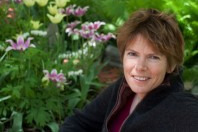
Thank you so much, Summer. There are many things you said that resonate with me. The idea of looking at a character through another character's eyes, for one, the importance of play. I've ordered books by a number of the authors you recommend. (I still miss Grace Paley, too.)
For readers here, I urge, urge, urge you to read Wrecker. It's a rare and beautiful novel. You will not be disappointed.
{Photo of Summer Wood by Miriam Berkley.}
April 23, 2011
Home now, & catching up

I'm back home now and slowly catching up. It was snowing when we arrived, the truck wouldn't start, there was a small flood in our basement, a pop can had exploded in a drawer and our car got stuck on an ice patch in the driveway.
But other than that, all is lovely. The sun came out this afternoon, and the vehicles are lined up and functioning.
I also got caught up with my agent, at last: we talked of film rights, ebook contract terms, the impossibility of getting republished in the UK (due to their prejudice against France) and the consequent possibility of me publishing my novels in ebook form there myself. (More on that later.)
And then, of course, we talked of The Next Novel, which she'd just read (in part, at least). She wasn't as happy with it as I'd hoped she would be. Tears are part of The Writing Life, and that's a fact. The cure for the dreaded Despond is to simply get to work, which I've already begun.
But speaking of tears, I'm just now posting a signed bookmark and bookplate to Rachel Maes, with very fond memories. This is the post I wrote about her shortly after I'd met her and her mother at a reading: Moved to tears. Thank you Rachel, for being such a loyal fan. It means a great deal.
April 21, 2011
Letter of the week: questions on the life of a writer
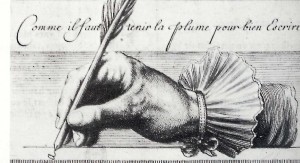
I just received an email from someone considering becoming a writer. She asked:
What projects are you presently working on?
Right now I have three projects hatching: 1) The Next Novel, now in 3rd draft; 2) a short novel for non-English readers, now in the exploration stage; and 3) a collection of historical snippets about youngsters marrying.
What is your writing schedule like? I guess everyone is different,
but I struggle with setting up and sticking to a schedule (with a day
job, but even if that wasn't the case, I don't have the best time
management).
I begin my writing day on rising (which is often before 6:00 am). I trick myself into this by having my (decaf) coffee fixings in my office. I break for a quick breakfast, but I generally write or revise until lunch. My afternoons are given to research, promotion, reading and correspondence.
Historical fiction is perhaps more time-consuming than other genres, but all require a full commitment. You would need to become obssessive about finding time for your writing, the more so since you have a day-job. Writing has to become a compulsion.
Over the course of your career, have you had to take on many different jobs to pay the bills while you wrote? (I'm guessing most writers do.)
I am fortunate to be married to a man who is good with money. That helps. Before I signed a contract for The Josephine B. Trilogy, I was working as a free lance book editor. Once a contract was signed, I had to give up both paying and volunteer community work in order to meet my deadlines. I didn't earn very much money for a very long time. One should never expect to make money from writing.
Do you have any general tips for writers?
I recently answered a similar question on Leah Marie Brown's blog. She asked what advice I would give to someone just starting a career in writing, and I answered:
1) Understand that you are unlikely to earn money being a writer, and that the only reason to pursue such a vocation is that you're compelled to do so, simply for the love of it.
2) Understand that it takes a very long time to get to the point where you are publishable. (As in years.) It's similar to getting a doctorate.
3) Write, write, write: regardless. Revise. ("Revision" = re-vision.)
4) Understand that this is a craft that must to be learned, so study books on the craft of writing.
5) Read constantly—especially books similar to the ones you aspire to write.
6) Build up a Net 2.0 presence: set up a website, blog, Tweet, Facebook.
7) Don't send your manuscript out for consideration until 5 readers have told you that it's indeed ready to go.
8) Collect rejections: it's rare for a writer to be published without first having a stack of them. It's an important first step. Plus, it proves that you are tough enough to be a writer.
9) Go to readings: observe how it's done. As a writer, you will have a private self as well as a public one. Get comfortable with that.
10) Get to know other writers, on-line, off-line; join the community. Create your tribe.
11) Never give up.
Bon courage. I hope this helps. That you took the time to send me an email shows that you're seriously considering. You said you wished to get a clear picture of the writer's life before launching yourself into it. It doesn't have to be all-or-nothing. I suggest you begin by taking a writing course or workshop. It's true that writing very hard, very demanding, but every writer I know feels blessed to be able to be a writer.
What would you add to my list?
April 10, 2011
The cost of promotion
Yesterday I dipped a toe into the pond of despond on agreeing to have bookplates and bookmarks printed for what seemed an exorbitant price.
Each bookplate, for example, cost me just under 40 cents—this for a book from which I likely won't earn more than 50 cents. Add in the price of the art, the design time, the postage, the envelope, and I'm running at a loss. Any business-minded person would disapprove. But when did books ever have anything to do with business?
Later that night I read about the promotion Guy Kawasaki did for his now best-selling book, Enchantment: The Arts of Changing Hearts, Minds and Actions. It made me feel like an amateur. Here's the article: HOW TO: Launch Any Product Using Social Media by Guy Kawasaki.
Now I'm amazed to have spent so little.
Plus, here they are—and they are so pretty.
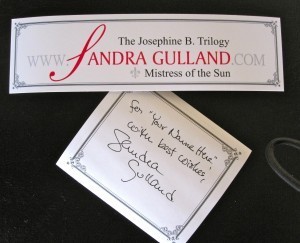
I'm pleased. Please let me know if you want a set. It will be a thrill to send them off.
I think the first reader to get them will the woman in Austria who sent me a lovely poem by Emily Dickinson in her request.
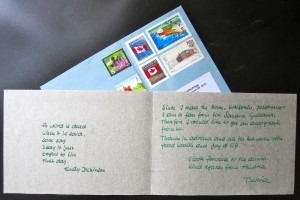
The value of this profession can't be put on a spreadsheet.
Even so, I'm going to continue to try to figure out a way to make bookplates more reasonably. If you know where I could buy individual self-adhesive labels (about 3×4″), do let me know. The label companies now only seem to sell labels in big sheets, which doesn't work when sending a single label to a reader.
April 5, 2011
Letter of the week: on dialogue and descriptive narrative

There is nothing quite so wonderful for an author as a serious reader. Here's part of an email:
Dear Sandra,
I just reread Mistress of the Sun a couple of months ago, and I came away surprised at how much dialogue there is, all of it excellent, and wondering why I missed this the first time. (I was probably just wrapped up in the story.) It makes me reflect upon different writers' approaches to narrative.
Edith Wharton always filled her books with so much description — description of rooms, curtains, spreads of food, not to mention description of the characters' emotions. I tend to think of Mistress of the Sun as being more like Hemingway: Not everything is made explicit by the author's voice, and we're invited to interpret meaning by closely observing what the characters are saying — or not saying — to one another. (This is ironic, of course, considering that your aristocratic subject matter is closer to Wharton's.)
Maybe I'm reading a bit too much into this, and maybe you're approaching the Next Novel in a different fashion. But that's what I've come away with.
Description is all-important, but very hard work, especially for historical fiction. My editors constantly push for more detail, and I'm glad they do.
I do tend toward what I like to think of as Gothic Minimalism. (I fancied I'd founded a School with those words, but no.) I try to be spare, and I like to see a lot of white on the page: this is where dialogue comes in. Plus, it's wonderful when characters start talking.
I often wish I could be more witty—I'm the person in the group who just doesn't get the joke—but basically I just comb a manuscript over and over again, cutting out dead wood with each pass, trying to be true. I look for what Butler so aptly calls thrum—that lively movement from one sentence to the next, one scene to the next.
"So no, Jordan, I don't believe my approach will change," she said. "At least with respect to dialogue," she added, thinking of the three people reading the third draft of The Next Novel, and wondering what they were thinking—knowing that there would have to be more descriptive detail. Perhaps I should reread Edith Wharton, she thought.
March 30, 2011
Putting Kindle readers to work as proofreaders
I'm told by Allegra, the editorial assistant at Turnstone, Simon & Schuster, in New York, that ebook errors happen because the text is shrunk. I'm simply to let her know and they will be corrected. (Thank you, Allegra.)
So I returned to AmazonKindle to check what's been highlighted by reader/proofreaders. Here's what I discovered:
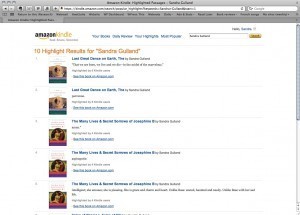
From The Many Lives & Secret Sorrows of Josephine B.:
–3 readers highlighted: In the light I see security, but in the shadows I see grief . . . in the shadows I see defeat.
–4 highlighted the typos "aman" (a man) and "aspisspotin" (as pisspot in)
–4 also highlighted: intelligent; she amuses; she is pleasing. She is grace and charm and heart. Unlike Rose: scared, haunted and needy. Unlike Rose with her sad life.
From Tales of Passion, Tales of Woe:
–3 readers highlighted, from the copyright page: Ogni talento matta. (Every talented man is a madman.)
–3 also highlighted: A woman's truths, how secret they must be. Hidden, buried, only to emerge in the night.
From The Last Great Dance on Earth:
–6 readers highlighted the sentence: That we are born, we live and we die—in the midst of the marvelous. (A wonderful Napoleon quote, in truth. I worked hard to get it in.)
–3 highlighted: We are punished for our pleasures; if only we were rewarded for our pain.
From Mistress of the Sun:
–3 readers highlighted: Patience is the companion of wisdom, her father had often said, quoting Saint Augustine.
What does this tell me?
One, that there are not too many typos. And two, that readers like wise nuggets. And three: that the Amazon recording system may be suspect. It seems too coincidental. As a novelist, I'd never get readers to believe it.
You might be pleased to know that the second most highlighted text for all of Kindle is:
It is a truth universally acknowledged, that a single man in possession of a good fortune, must be in want of a wife.
From Pride and Prejudice, of course, by Jane Austen: highlighted by 3547 Kindle users.
As for the #1 favourite? It's a quote from Cutting for Stone by Abraham Verghese that begins:
The key to your happiness is to own your slippers, own who you are, own how you look, own your family, own the talents you have, and own the ones you don't.
What do you think? Are you a highlighter? (I am: shamelessly so.)

